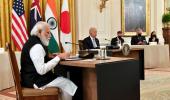'The pressure to work together is even greater than before because the Chinese have launched a full-court press on the border, in the region, and globally to advance their geopolitical agenda.'

"Much of the assistance India is getting is hard to quantify because it happens in the shadows," explains Milan Vaishnav, Senior Fellow and Director, South Asia Programme at the Carnegie Endowment for International Peace in Washington DC.
Dr Vaishnav's primary research focus is the political economy of India. He examines issues such as corruption and governance, State capacity, distributive politics, and electoral behaviour.
He also holds a regular podcast on Indian politics called the Grand Tamasha.
Dr Vaishnav discusses the key takeaways from the Biden-Harris-Modi in person meetings with Rediff.com's Archana Masih.The first of a two-part interview:
What have been the key takeaways from Mr Modi's first trip to the USA under the Biden administration?
I think this was a case of the Quad meeting overshadowing the bilateral sit-down between Modi and Biden.
The bilateral conversation was important, not least because it was the first time the two leaders were meeting in person since Biden entered office in January of this year.
However, the in-person meeting of the Quad leaders took precedence, for at least three reasons.
First, the meeting represents a new chapter for the Quad, one in which the four countries have committed to a pretty wide-ranging agenda that straddles security, economics, and technology.
Second, the meeting sent a very clear signal to China -- even though the 'C' word was not mentioned by name -- that these four Asian powers are stepping up their coordination to provide an alternative roadmap for the Indo-Pacific.
Last but not least, the meeting came on the heels of the AUKUS fracas in which the US, UK, and Australia agreed to cooperate on nuclear submarine technology, a move that irked France (which lost a hefty contract to provide diesel-powered subs to Australia).
AUKUS strained tensions between longtime allies -- the United States and France -- and raised questions about the coherence of the West's Indo-Pacific framework.
The Quad, though separate and apart from the AUKUS arrangement, helped to change the narrative.
India and America have built very strong security relations in the past few years -- what gains, if any, did India get on issues like terrorism -- and more importantly about the relentless challenges from China at the border?
I think much of the assistance India is getting is hard to quantify because it happens in the shadows. When the two sides share sensitive intelligence on terrorist activity, that's not necessarily going to make headlines.
When the US sends a strong private diplomatic signal to China about its actions on the China-India border, that's also not observable. But we know from current and former senior officials that this type of collaboration is happening.
But we're also seeing signs that are more visible, such as US drone sales to India, enhanced military coordination and exercises, and the fact that the US and India have a separate working group to coordinate on terrorist designations -- a critical part of the sanctions regime.
How do you assess the Biden administration's relationship with India? What are the major points of difference from the Trump administration so far?
Thus far, I think the Biden administration has really leaned into the India relationship. The focus has been on strategic affairs, but I think this US administration has not sought to antagonise India on economic issues, for instance, where real differences remain.
The Trump administration had a single-minded focus on narrowing the bilateral trade deficit, which tended to overwhelm other aspects of the economic dialogue.
It is my understanding that the US and India hope to work out a 'mini-trade deal' that might weaken some of the irritants in the relationship.
A big test case here is going to be the digital economy, where stringent measures in India (on e-commerce, encryption, and data localisation) could spark a backlash in Washington.
Obviously, the US withdrawal from Afghanistan was not welcomed in India, to put it mildly, where there are serious concerns about the strategic victory for Pakistan and the potential for instability and cross-border violence.
But, going forward, I think the US is going to coordinate very closely with India on outreach to, and discussions with, the Taliban.
I think Washington is quite aware of India's concerns about its western front and I expect there to be close coordination going forward.
Feature Presentation: Aslam Hunani/Rediff.com











 © 2025
© 2025